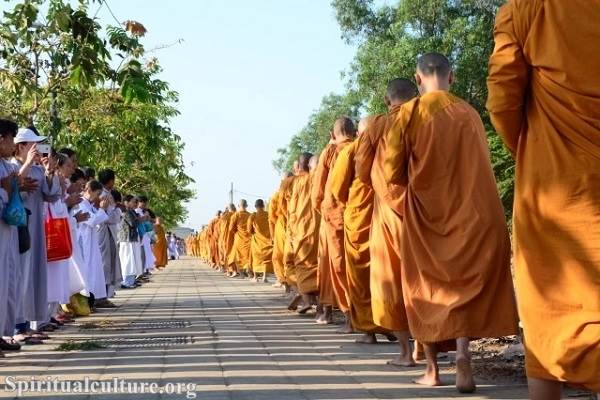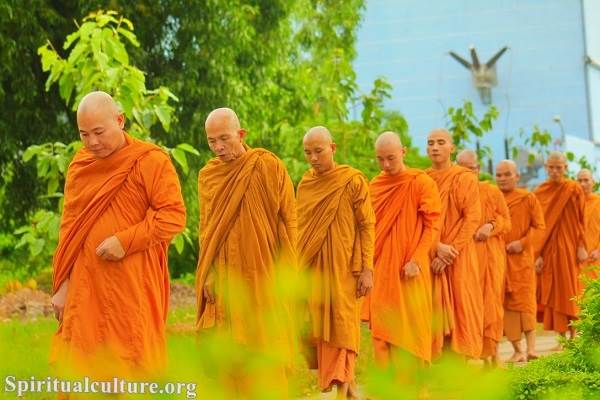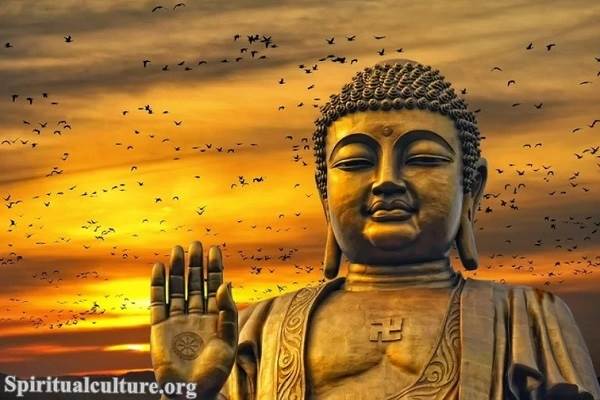The Sangha is a community of Buddhist practitioners, including monks and nuns, who have taken vows to live by the teachings of the Buddha and to support one another in their spiritual development.
The Sangha is an important part of the Buddhist tradition, as it provides a supportive environment for practitioners to study and practice the Dharma (the teachings of the Buddha). The Sangha is also responsible for preserving and transmitting the teachings and practices of Buddhism from generation to generation.
In traditional Buddhist societies, the Sangha is often considered a third gem, alongside the Buddha and the Dharma, collectively known as the “Three Jewels” or “Three Treasures.”
In many cultures, the Sangha is held in high regard and is seen as a source of spiritual inspiration and guidance. The Sangha is also a source of support and friendship for its members, and many practitioners find great joy and fulfillment in being part of a community of fellow seekers.

The Sangha is a diverse community that includes lay practitioners, ordained monks, and nuns. Lay practitioners may support the Sangha through financial or material donations or by volunteering their time and energy to help with various tasks.
Ordained members of the Sangha take vows to follow a code of conduct that includes ethical guidelines for behavior, such as abstaining from harming living beings, stealing, and engaging in sexual misconduct.
In some traditions, monks and nuns may also be required to follow specific rules regarding their daily routines and activities, such as observing periods of silence or abstaining from certain types of food. These rules are intended to help practitioners cultivate mindfulness and to support their spiritual development.
The Sangha plays an important role in spreading the teachings of the Buddha and preserving the Buddhist tradition. Monks and nuns may study and teach the Dharma to lay practitioners, and they also often play a role in the community by providing spiritual guidance and support to those in need.

In addition to supporting one another in their spiritual practice, members of the Sangha may also engage in various forms of social service, such as providing education, healthcare, and other assistance to those in need. This commitment to service is an expression of the Buddha’s teachings on compassion and kindness and is an important part of the Sangha’s role in the world.
It is important to note that the Sangha is not a monolithic entity, and different Buddhist traditions may have slightly different understandings of the role and purpose of the Sangha. In some traditions, the Sangha is seen as a “field of merit” that lay practitioners can support to accumulate good karma. In other traditions, the Sangha is viewed more as a community of spiritual friends who support and encourage one another in their practice.
Regardless of the specific role the Sangha plays in different traditions, it is generally seen as an essential component of the Buddhist path. The Buddha himself emphasized the importance of the Sangha, saying that it is through the Sangha that the Dharma can be properly preserved and transmitted from generation to generation.
Suppose you are interested in learning more about the Sangha and how to get involved. In that case, you may want to consider visiting a local Buddhist center or temple and speaking with members of the Sangha or lay practitioners about their experiences. You may also find it helpful to read about the Sangha in Buddhist texts or to attend classes or retreats led by monks or nuns.


